13 Infamous Fast Food Chain Recalls
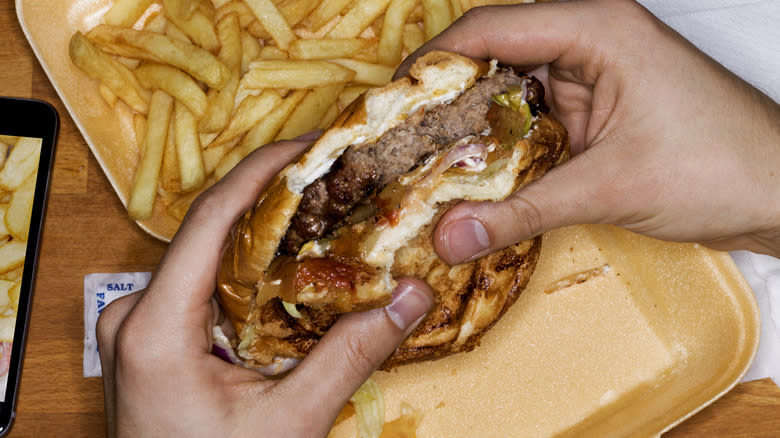
According to a 2018 survey conducted by Statista, nearly a third of polled Americans claimed to eat fast food between one and three times a week. A further 15% said they ate fast food four to six times per week. Much has been said about statistics such as these, most pertaining to the health impact of regularly consuming fast food. But today, we're not concerned with cholesterol or sodium. Fast food also poses acute health risks thanks to an abundance of faulty, contaminated, and dangerous food served by various chains. This is an all too common occurrence, to which the high number of recalls issued by fast food chains attests.
Dangerous food is sold by fast food chains almost as frequently as it appears in grocery stores. This should not come as a surprise. After all, fast food chains often source their ingredients and products from the very same suppliers that have contracts with grocery store brands. What's more, the volume of food -- and indeed, other potentially faulty products, including toys -- that fast food chains shift makes them a likely hub for outbreaks of both illness and injury.
As with grocery store brands, fast food chains try to mitigate the impact of faulty food and products by issuing recalls. While these recalls protect some customers, they are often too late to protect everyone, as is proven by several of the following recalls.
Read more: The Ultimate Ranking Of American Fast Food Restaurants
Tim Hortons Soup Base Recalled Because It Contained Insects
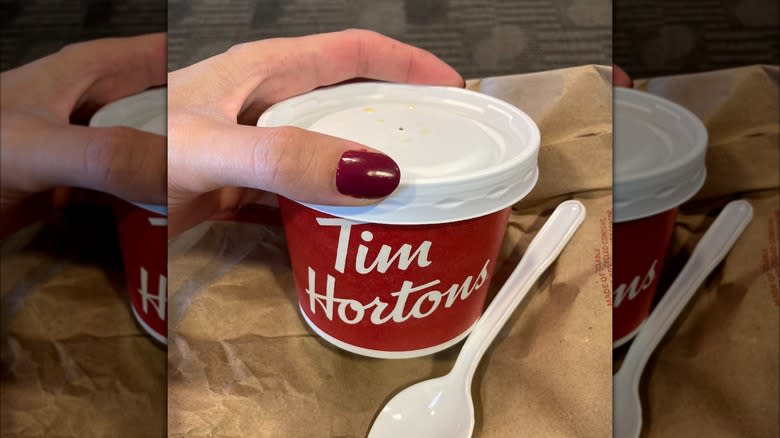
Initially known for its coffee and delicious donuts, Tim Hortons has worked diligently to expand its offered range of food and drink. Chicken noodle soup is one option that was added to the menu years ago and has been a feature ever since. However, the frozen base that's used to make the soup grabbed headlines for all the wrong reasons in 2022 when the company issued a recall. The base was found to contain insects.
This problematic base was recalled from Tim Hortons in both Ontario and Alberta, and the affected Tim Hortons locations replaced the faulty product with another soup base made by a different supplier. In a statement reported by CBC, a spokesperson for Tim Hortons dodged questions about how the contamination had occurred, saying, "We continue to investigate this incident with the food supplier involved and will only restart our production with them once we are confident the issue will not happen again."
The soup base was also recalled from hotels and other institutions. However, it is important to note that Tim Hortons' canned chicken noodle soup, which was available in grocery stores at this time, was not affected by the recall. That being said, we can't imagine many customers opting to buy the canned soup after seeing Tim Hortons embroiled in such an unappetizing recall.
Burger King Recalled A Toy Due To Suffocation Hazard
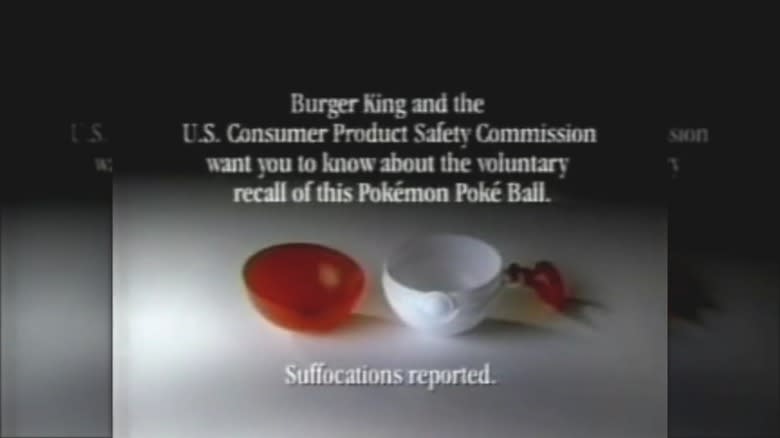
To celebrate the release of the 1999 film "Pokémon: The First Movie," Burger King distributed a range of 57 different Pokémon-themed toys that were included as part of the fast food chain's kids meals. The toys were packaged inside a plastic Poké Ball that split in half. These halves posed a risk to children under three years old, as they could cover a child's mouth and nose. In this manner, a 13 month old girl and a 4 month old boy suffocated in December 1999 and January 2000 respectively.
Burger King didn't immediately recall or stop distributing the Poké balls after the young girl's death. It was only after a near miss, wherein a child's father forcibly removed a Poké Ball from his child's face, that the chain relented. As per the Consumer Product Safety Commission, Burger King issued a recall for more than 25 million Poké Balls on December 27, 1999.
Given the potentially fatal nature of the product, Burger King tried to raise as much awareness as possible. Over 8,000 Burger King locations posted physical recall notices in their dining areas while the Burger King office sent notices to over 90,000 healthcare clinics and offices. The company also shared the news by placing ads in USA Today and through an announcement made on "The Today Show". Unfortunately, many Poké Balls remained in family homes, one of which led to the young boy's death.
Taco Bell Recalled Seasoned Beef Due To Metal Contaminants
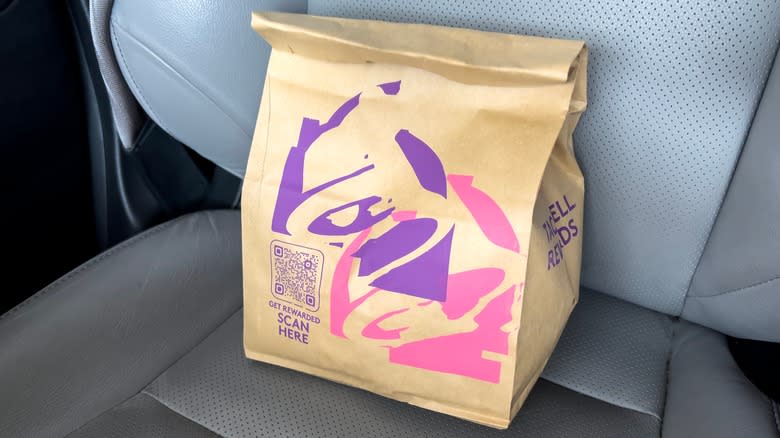
In October 2019, the Food Safety and Inspection Service announced that Kenosha Beef International was recalling a seasoned beef product produced specifically for, and only distributed to, Taco Bell. The recall was issued after three Taco Bell customers reported finding pieces of metal in their food. Restaurants in 21 states were affected by the recall. These locations summarily discarded the faulty beef and there were no further reports of customers encountering metal shavings in their Taco Bell order.
In a statement recorded by Food Safety News, Julie Masino, who was president of Taco Bell for North America at the time, said, "As soon as we received the first consumer complaint, we immediately acted to remove the product from the affected restaurants and proactively worked with the supplier to inform the USDA of our steps to protect our guests." The resulting recall saw more than 1.2 million pounds of beef eventually recovered and discarded by the fast food chain. No injuries were reported, making this fast food recall successful.
Jack In The Box Replaced Hamburgers After An E.coli Outbreak
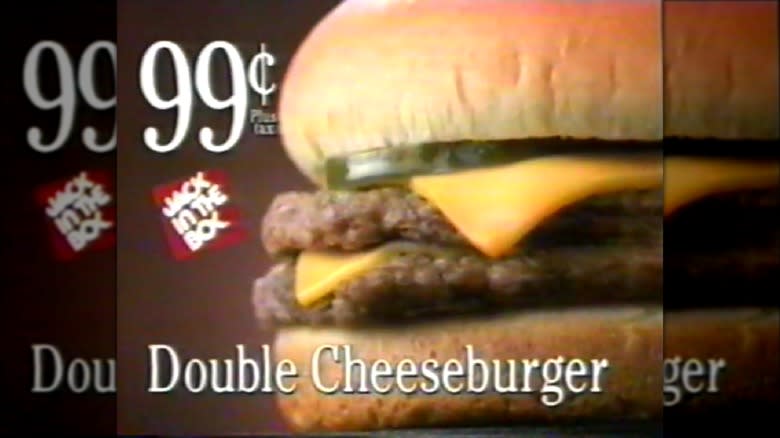
Jack in the Box is at the center of one of the most infamous fast food chain recalls -- and one of the world's biggest food poisoning scares -- of all time. The chain served up undercooked burgers, which led to an unprecedented E. coli outbreak that lasted from November 1992 to February 1993. This outbreak caused at least 477 individuals to fall ill. Of these people, 144 were hospitalized and 30 developed uremic hemolytic syndrome, a disease that can severely damage the kidneys. Four children died as a result of the outbreak and many others were left with life-altering medical conditions including Brianne Kiner, a 10 year old who was only released from hospital six months after she initially fell ill.
The outbreak was traced to patties supplied to Jack in the Box by Vons Cos. Once informed of this, Jack in the Box replaced all the hamburgers in its affected restaurants and instructed its staff to cook the burgers more thoroughly; up until the outbreak, staff had been told to cook patties to the federal standard of 140 degrees Fahrenheit. Just 15 degrees more and the E.coli bacteria would have likely died prior to being served. The fast food chain also dropped Vons Cos as a supplier. But of course, these reactionary steps did nothing to change the fact that numerous peoples' lives were drastically altered by faulty fast food.
Green Onions Recalled After Chi-Chi's Hepatitis A Outbreak
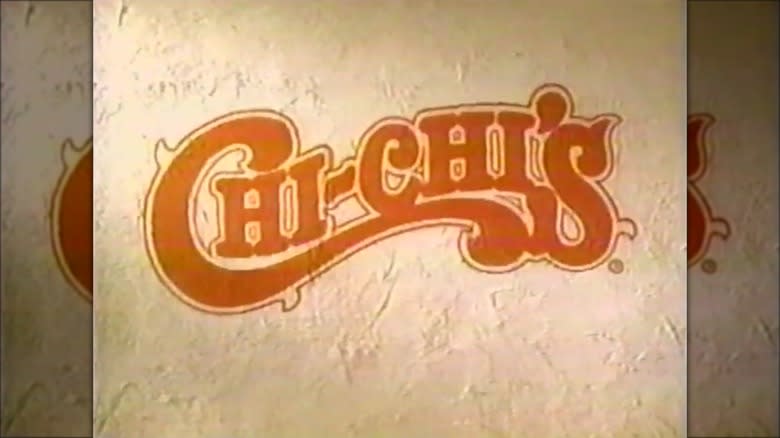
Monaca, a Pennsylvania town of less than 6,000 people, was at the center of an alarming fast food recall in 2003 when more than 650 people contracted hepatitis A. At the time, this was the largest foodborne hepatitis A outbreak the United States had ever seen. The outbreak was traced back to Chi-Chi's, a restaurant chain that served Mexican-inspired food. The green onions which were used in over 50 of the chain's dishes were found to be at fault. Four people died as a result of the outbreak and thousands had to get inoculations to prevent themselves from falling ill.
The restaurant in question voluntarily closed when the outbreak took hold. The green onions were traced back to several farms in Mexico, and the Food and Drug Administration recommended that all Chi-Chi's restaurants, regardless of supplier, cook the green onions thoroughly before using them.
The scale of this outbreak caught specialists off-guard. In an interview with The New York Times, Richard McGarvey, a spokesman for the Pennsylvania Department of Health, said, "We first started the investigation looking at food handlers, but the numbers kept going up. We had no idea the numbers would go up that high." Already struggling financially, Chi-Chi's didn't recover and the chain closed down soon after.
McDonald's Recalled Shrek Glasses Amid Toxicity Concerns
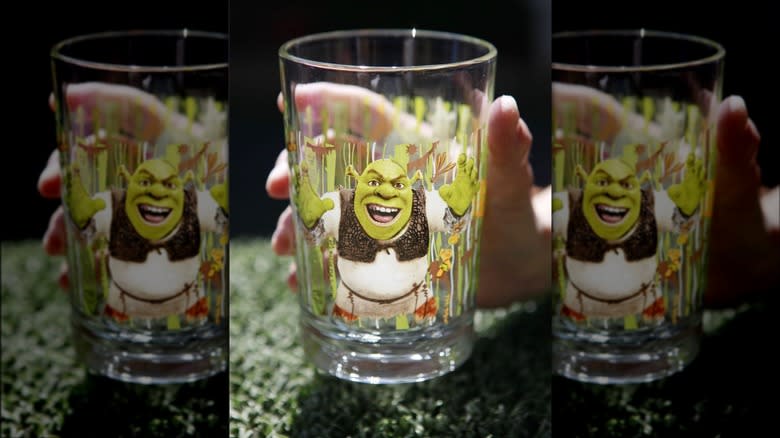
In 2010, the Shrek franchise celebrated the release of its fourth film, "Shrek Forever After." To mark the occasion, McDonald's sold several Shrek-themed products including a mint "ogre-load" take on the ice cream-based McFlurry and more than 13 million Shrek-themed drinking glasses; 12 million in the United States and approximately 1.4 million in Canada. Come June, McDonald's was recalling all of them -- a $15 million expense -- over toxicity concerns.
The glasses passed all federal and state requirements. But McDonald's made the decision to recall the products after the Consumer Product Safety Commission reconsidered its stance on cadmium levels in products. As Scott Wolfson, a senior member of CPSC, said in a statement reported by PRNewswire, "When the U.S. Consumer Product Safety Commission approached McDonald's about cadmium in their current movie-themed drinking glasses, the company responded quickly, agreed to cooperate fully and acted on the side of caution."
This recall was widely celebrated in the press. McDonald's acted quickly, behaved in a forthright manner, and did not point fingers at any other company -- characteristics many other fast food chains still fail to emulate during recalls. What's more, there were no reports of any illness associated with the glasses.
Wendy's Removed Lettuce From Restaurants After An E.coli Outbreak
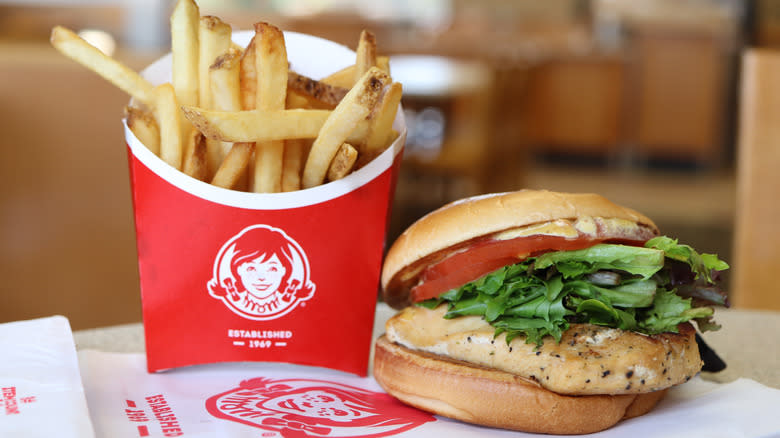
During August 2022, the Centers for Disease Control and Prevention shared the news of an E.coli outbreak that caused 109 illnesses across six states. A total of 52 people were hospitalized. The outbreak was traced back to Wendy's restaurants, however, a single food was not identified as the definite source of the outbreak. That said, the vast majority of those who fell ill reported that they'd consumed the restaurant's romaine lettuce. Wendy's subsequently recalled the romaine lettuce from all affected restaurants.
Unfortunately, this recall came too late to prevent many customers from suffering. Hillary Kaufman, a Wendy's customer who contracted E.coli after eating at one of the chain's restaurants, told NBC News, "I thought my insides were going to pop out. My stomach looked like I was pregnant -- it was so swollen from being inflamed." No deaths were linked with Wendy's contaminated lettuce. A lucky escape, especially considering the severity and scope of the outbreak.
Subway Recalled Grilled Chicken Due To Plastic Contaminants
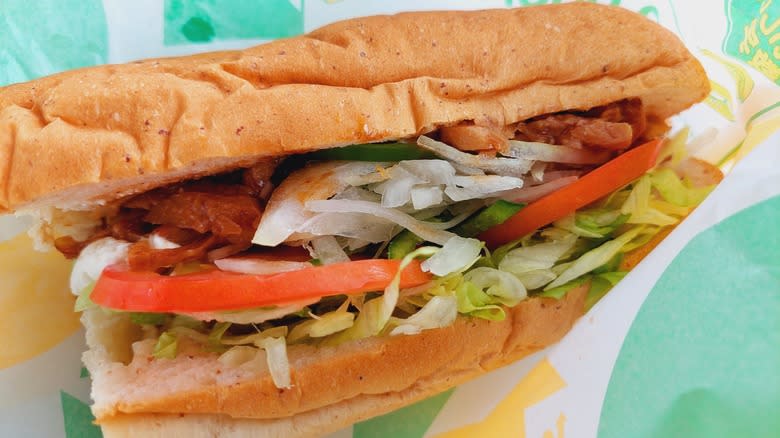
Subway's grilled chicken sandwiches -- generally some of the better fast food grilled chicken sandwiches around -- entered the spotlight in April 2015 when West Liberty Foods issued a recall for its grilled chicken breast patty with rib meat, due to contamination with pieces of plastic. According to the Food Safety and Inspection Service, both this supplier and Subway only became aware of the contamination after customers complained of finding plastic in their sandwiches. It is not known exactly how many customers were served the contaminated food.
Around 34,000 pounds of the product were placed under recall with just under 20,000 pounds actually being recovered. The affected Subway units were located in five states: Illinois, Oklahoma, Minnesota, Utah, and Texas. Fortunately, no injuries, oral or otherwise, were reported, despite the Department of Agriculture grading the recall as class one, the highest possible.
Unfortunately for Subway, this incident was not isolated. Over the years, multiple Subway customers have found unsavory and inedible items in their sandwiches. Some have even shared pictures of these items on Reddit, including plastic tags, plastic fragments, and even pieces of metal, in their food.
Taco Bell Changed Lettuce Suppliers After E.coli Outbreak
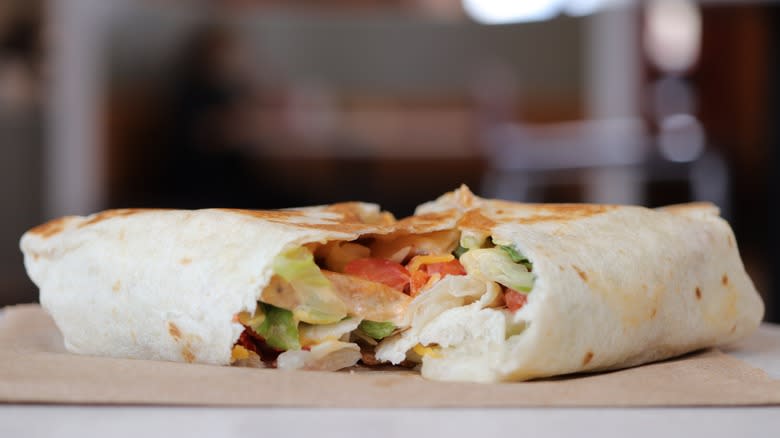
In 2006, Taco Bell restaurants were the epicenter of an E.coli outbreak that ravaged the northeastern United States. The Centers for Disease Control and Prevention reported that at least 73 people fell ill during this outbreak of which 53 had to be hospitalized. A total of eight people developed hemolytic uremic syndrome. By performing interviews with those who fell ill and using DNA fingerprint testing, it was confirmed that contaminated shredded lettuce grown in California caused the outbreak. Taco Bell acted swiftly, pulling the lettuce from stores and subsequently changing suppliers for the affected restaurants.
This E.coli outbreak was one of several that rocked the U.S. during 2006. Contaminated lettuce from California served by Taco John's also caused an outbreak that year, as did spinach grown in California. This led to major concern over the state's growing procedures. Speaking to the Los Angeles Times, food pathologist Trevor Suslow said, "The fact that it seems to be happening even more frequently, in a more compressed time frame, one would have to speculate something is either being missed or something has changed to elevate the level of risk or potential of contamination." Wisely, Taco Bell opted to double its testing on food suppliers in an attempt to avoid falling foul of this uptick in foodborne illnesses.
Clover Sprouts Recalled After Multiple Jimmy John's E.coli Outbreaks
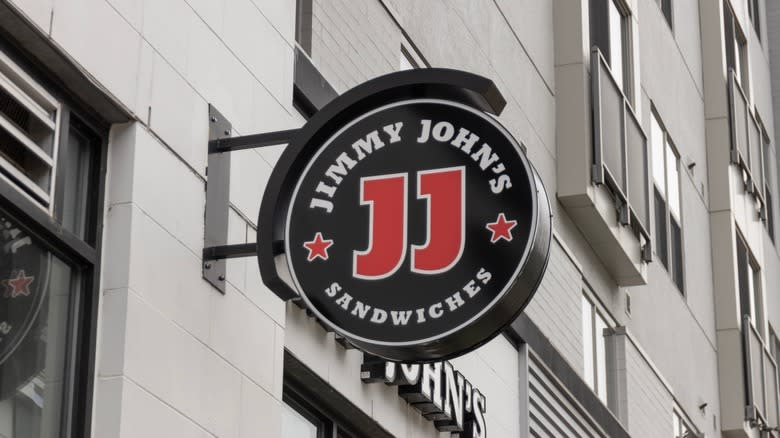
Jimmy John's, a fast food chain known for its sandwiches, was in the news in 2019 when 15 Iowa restaurants were linked to an E.coli outbreak that sickened more than 20 people. The affected clover sprouts were recalled and destroyed. The Food and Drug Administration reported that the E.coli present on these sprouts was also linked with a later E.coli outbreak that occurred in 2020 which sickened over 50 people. To make matters even worse, Jimmy John's clover sprouts had already been linked to an outbreak of E.coli in 2014.
The irony of all this is that clover sprouts were introduced to the Jimmy John's menu as a replacement for alfalfa sprouts, after the latter sprouts were linked to numerous Salmonella outbreaks. It was thought clover sprouts would be safer as they are smoother and thus easier to clean. However, this proved not to be the case. After multiple recalls, Jimmy John's made the difficult decision to pull the sprouts from its menu for good.
McDonald's Pulled Salad After Cyclospora Infections
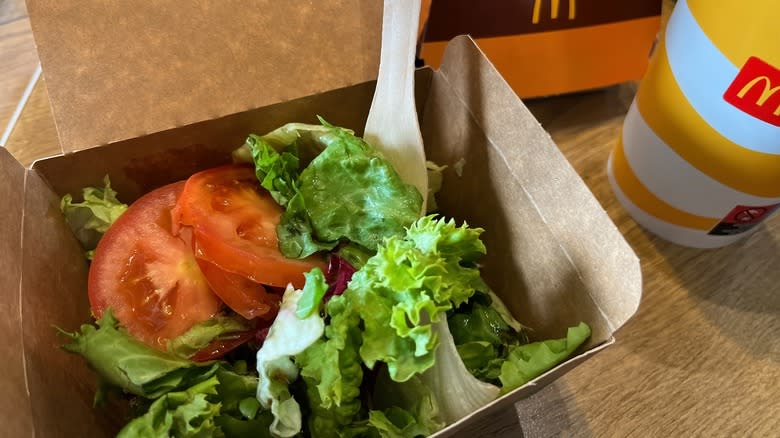
In 2018, McDonald's recalled salad from over 3,000 restaurants in the Midwest after it was found to be contaminated with a parasite known as cyclospora. While the recall was prompt, the contaminated salad was served for long enough to cause over 500 McDonald's customers to become ill. These individuals suffered from symptoms including stomach pain, diarrhea, and vomiting. No deaths were reported.
After recalling the lettuce, McDonald's made the decision to switch lettuce suppliers for the affected restaurants. It was never discovered how or where in the supply chain the salad became contaminated with cyclospora. Fresh Express, McDonald's supplier at the time of the incident, assured the FDA that all other companies that purchased the product had been given a recall notice and that all of the potentially contaminated stock held by Fresh Express had expired and been destroyed. Still, this was too little too late for McDonald's ill customers.
Chick-Fil-A Recalled Dipping Sauce Due To Undeclared Allergens
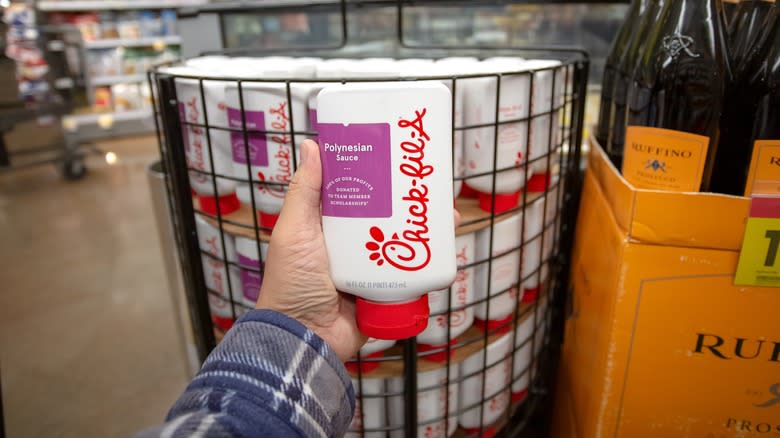
Between February 14 and February 27 2024, T. Marzetti Co., one of Chick-fil-A's suppliers, accidentally filled Polyensian sauce dipping cups with an entirely different sauce. This incorrect sauce was distributed to 27 states. Chick-fil-A subsequently issued a recall.
While seasoned customers likely spotted the difference as soon as they saw the sauce -- Chick-fil-A's sweet, tangy Polynesian sauce is a fan favorite -- others who weren't familiar with the chain did not. As one Redditor on the r/Celiac subreddit wrote, "it was actually my first time ever having it, I usually stick to the chick fila sauce only. Honestly I'm not sure if i was glutened but I know I ate that last week and haven't been feeling the best."
Receiving the incorrect sauce is an annoyance for all customers, but for some it also poses a serious food safety risk. This is because consumers do not know if what they are eating contains allergens. In Chick-fil-A's case, the sauce that was erroneously distributed contained both wheat and soy, two allergens that can cause serious complications in those vulnerable to them. That being said, there were no reports of severe illnesses or reactions occurring as a result of this mistake.
McDonald's And Burger King Recalled Apple Slices Due To Possible Listeria Contamination
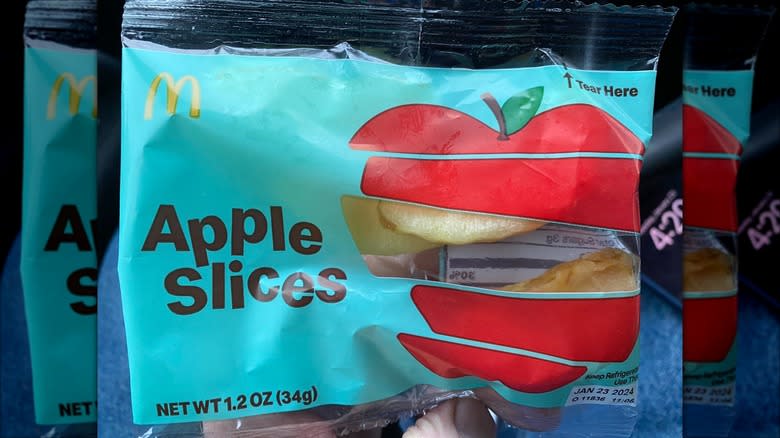
In August 2012, Missa Bay LLC recalled just under 300,000 units of pre-sliced apples over concerns they were contaminated with Listeria monocytogenes. The product was shipped to grocery stores and fast food restaurants in 36 states. Both Burger King and McDonald's restaurants were affected by the recall and scrambled to remove the sliced apples from their restaurants.
This recall was especially concerning for McDonald's, which sells huge amounts of sliced apples every year. In fact, 10% of all sliced apples sold in the United States are sold in McDonald's restaurants. Luckily for all parties involved, and despite the immense scope of Missa Bay's recall, no illnesses were reported in conjunction with the sliced apples. All potentially harmful products were successfully disposed of and the affected restaurants soon went back to offering their usual range of crisp and delicious fruit.
Read the original article on The Daily Meal.

